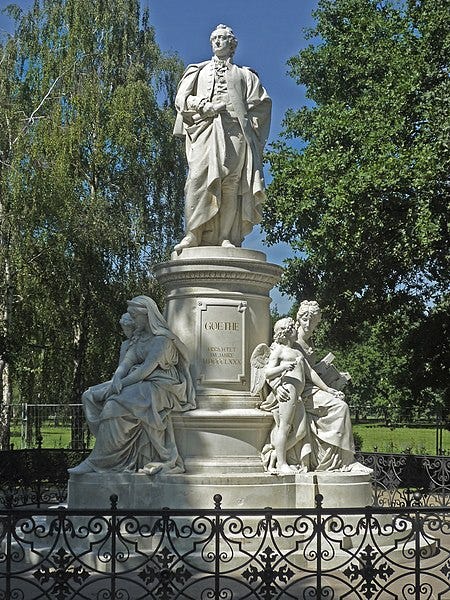Every once in a very long while, there comes a poet or an artist or a composer on the scene whose genius is so broad-ranging and titanic, he seems to stand above all ages. “He was not of an age, but for all time,” said Ben Jonson of his friend, fellow playwright and actor and theater manager, William Shakespeare, and Ben was not one to bestow compliments freely. Cervantes could only have come from the end of Spain’s golden age, and his love for his native land is plain to see, but the mystery of the Knight of the Mournful Countenance will never be exhausted. The only superlative imitator of Michelangelo that I know of was Auguste Rodin, and he arrived more than three centuries later and in the haven of another nation; Bernini, a titan in his own right, knew better than to try to outdo the master in his element. And then Germany has Goethe, the long-lived and immensely productive poet, dramatist, philosopher, and scientist, who could only have arisen in the Germany of his time, spanning the classicism of the late eighteenth century and the romance of the early nineteenth, but rising far above them — impossible to define.
And this brings us to our Poem of the Week, a six line aphorism that I first read in a German poetry class at Princeton. It doesn’t even have a title, so that I’ve referred to it by its first few words, translated into English. It’s to be found in a collection of such: proverbs, you might call them, small jewels of meaning and suggestion. I don’t look down on folk sayings. You can find them in every culture in the world, and they will be familiar to you even if you’ve never heard them before. That is because they are the distilled general wisdom of mankind. They are like folk tales in that way. The physical terrain may be different; you may be on a mountain or in a jungle; the talking animals may be bears or elephants or kangaroos; but the human terrain is the same.
But it seems to me that the best poetic aphorisms do more. They don’t violate that folk wisdom. They may be nourished by it. But they suggest to you something you had never thought of before, at least not in quite that way, and they do so in a simple and plain form, so that you think you’re hearing the folk wisdom you are accustomed to, and when it proves to be more than that, the sheer form of the aphorism delivers the wisdom with all the power of a statement of eternal truth, or a command from on high.
Our theme this week, obviously, has been thanksgiving, so the poem I’ve chosen has that for its command. Yet you might not think so at first. “In Atemholen sind zweierlei Gnaden,” says the poet, and right there we’ve got a surprise, delivered in the most matter-of-fact way. The clause means, “In breathing there are two kinds of,” — what? Gnaden — grace; mercy; gentleness. Whenever we take a breath, we experience grace or mercy in two ways. Goethe has already hooked us. What two kinds of grace? Let’s hear them! Simple enough: “Die Luft einziehen, sich ihrer entladen” — “To take the breath in, to let it out again.” The line itself builds up in the middle, pauses at the comma, and then comes back down, so that when you say it, you yourself do what the line describes.
So what’s the point? Isn’t that all just one simple thing? Not exactly, says Goethe. “Jenes bedrängt, dieses erfrischt” — “That one grips us hard, this one refreshes.” And that is just what life itself is: “So wunderbar ist das Leben gemischt,” “So wonderfully mingled is life.” And now we sense that we are drawing near the edge of the mountain, to see far and wide. Goethe does not disappoint. The last two lines are a command: “Du danke Gott, wenn er dich presst, / Und dank ihm, wenn er dich wieder entlässt.” They are a command to give thanks for both kinds of grace, the grace of being beset with difficulty, and the grace of relief; the grace of suffering, and the grace of release. “Thank God when he presses you, / And thank him when again he lets you go.” It is the in-breathing and out-breathing of this life full of wonder and mystery. Goethe is suggesting that to want only one of these graces in this life of ours in this world would be like wanting either to take breath in without allowing it to refresh us, or to have our lungs at rest and not bothered with the pressure of breathing.
Those last two lines in German are brilliant. The first is what we’d call iambic tetrameter, eight syllables, four strong beats, and again the suspension after the word presst does to your lungs what the line itself means, and then comes the final line, ten syllables, the longest in the poem, like a long breath released. Here the religious meaning of grace is in full play. I know what I would be if God had never pressed me. Or I guess I can say that I don’t know, but I tremble to think of it. It’s a real life God grants us, not a padded cell. What ultimately and eternally awaits those who cast themselves on the mercy of God, Goethe does not say, and I won’t speculate as to the specifics of his religious belief. The aphorism applies to our daily lives, here and now.
I have included my own translation of Goethe’s original, following the German.
Im Atemholen sind zweierlei Gnaden: Die Luft einziehen, sich ihrer entladen; Jenes bedrängt, dieses erfrischt; So wunderbar ist das Leben gemischt. Du danke Gott, wenn er dich preßt, Und dank ihm, wenn er dich wieder entläßt. Two kinds of grace there are in taking breath: To bring the air in, and to let it out. That clenches, this refreshes us; So wonderfully mingled is our life. Thank God then, when he presses you, And thank him, when he lets you go again. © Anthony Esolen (2024)
Listen to this episode with a 7-day free trial
Subscribe to Word & Song by Anthony Esolen to listen to this post and get 7 days of free access to the full post archives.













